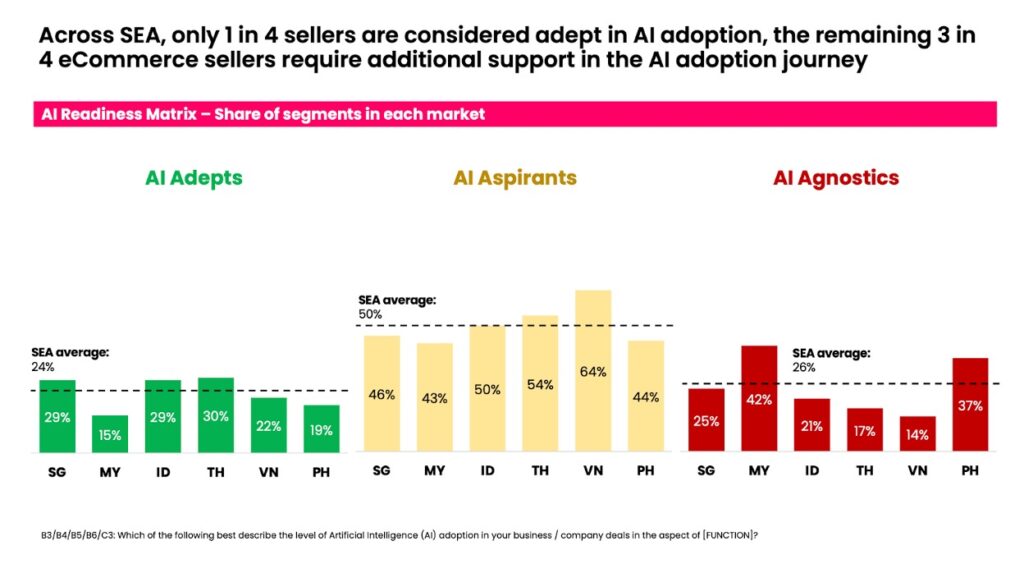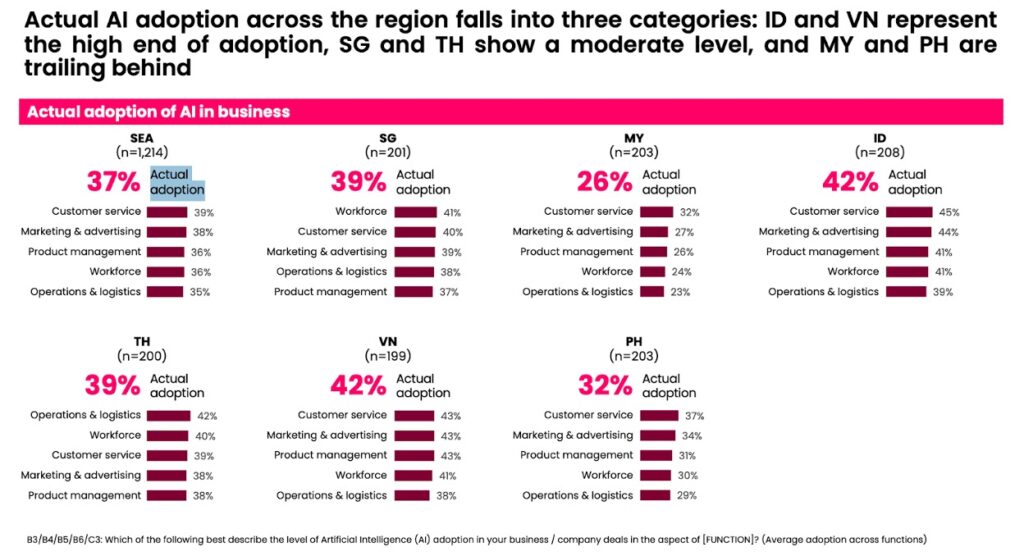|
Getting your Trinity Audio player ready...
|
Southeast Asian online sellers are widely aware of artificial intelligence (AI) but are relatively low in actual adoption
in business operations, according to a new joint study by e-commerce platforms Lazada and Kantar.
The study, titled “Bridging the AI Gap: Online Seller Perceptions and Adoption Trends in Southeast Asia,” which surveyed 1,214 online sellers from the Philippines, Vietnam, Singapore, Indonesia, Malaysia, and Thailand, paints a picture of both optimism and uncertainty regarding AI in e-commerce.
The study says that while 68% of sellers are familiar with AI and 89% agree on its importance for productivity, 61% question its immediate usefulness, while 64% cite cost and complexity as major barriers to adoption. Interestingly, half of the sellers already use AI in their personal lives, but business application significantly lags behind.
Profiling AI adoption: Who’s leading and who’s left behind
To categorize the levels of AI readiness, the study introduced an AI Readiness Index, dividing sellers into three groups: AI
Adepts (top 25% in adoption), AI Aspirants (average adoption), and AI Agnostics (bottom 75%).
Alarmingly, only one in four sellers in the region are considered AI Adepts, signaling that most businesses are still far from full AI integration. The gap between perceived and actual AI usage is most pronounced in Thailand, Indonesia, and
Singapore, despite their economic and digital infrastructure advantages.

AI across business functions: Uneven implementation
The report explored AI usage across several key business areas. In operations and logistics, AI is commonly used for
inventory tracking and security but less so for advanced robotics. Product management sees AI applied to content generation, such as product reviews and descriptions, while tasks like product bundling remain largely manual.
In marketing and advertising, AI-driven social media strategies are gaining traction, but customer segmentation remains underutilized. Chatbots dominate customer service AI tools, while more sophisticated systems like ticket routing are still limited, particularly among AI Agnostics. Workforce management reflects a mixed picture: AI adoption is higher among Adepts and Agnostics but less accepted by Aspirants, showing a varied employee response to automation.
Market-specific trends: Leaders and laggards

The study reveals notable differences in AI adoption across Southeast Asian countries. Indonesia and Vietnam lead with higher actual adoption rates, followed by Singapore and Thailand with moderate levels. Malaysia and the Philippines trail behind.
Despite strong infrastructure, Singapore struggles with upskilling and access to the latest AI tools. Conversely, Malaysia shows good theoretical understanding but faces infrastructural limitations that hinder practical integration. These nuances suggest that tailored strategies are required for each market to overcome their unique obstacles.
Seller demands: More AI tools and support
According to the study, Southeast Asian sellers are keen on improving their experience through more AI-powered tools and stronger platform support. The desire for enhanced AI capabilities is strongest in Thailand (53%), Vietnam (48%), and the Philippines (43%). Commonly known and used features include AI chatbots, seller assistants, and analytics tools, with chatbots being the most appreciated for their functionality.
On the e-commerce Lazada platform, the most recognized tools include Lazada Business Advisor, Lazada Sponsored Solutions, and AI Selling Points, all of which receive high marks for satisfaction. However, product-focused AI tools like smart listings and product optimization remain underutilized, pointing to a need for better seller education and awareness.
Bridging the AI gap: A regional priority
The study concludes that Southeast Asia’s e-commerce sector stands at a pivotal moment. Sellers are aware of AI’s potential to drive efficiency and growth, yet the road to adoption remains riddled with cost, complexity, and knowledge hurdles.
Bridging this gap will require strategic investment in infrastructure, widespread education initiatives, and platform-driven support systems. By addressing these challenges head-on, the region’s online sellers can unlock the full potential of AI and thrive in an increasingly competitive digital economy.
In order for artificial intelligence (AI) to work right within the law and thrive in the face of growing challenges, it needs to
integrate an enterprise blockchain system that ensures data input quality and ownership—allowing it to keep data safe while also guaranteeing the immutability of data. Check out CoinGeek’s coverage on this emerging tech to learn more why Enterprise blockchain will be the backbone of AI.
Watch: Educating the government on potentials of blockchain

 02-24-2026
02-24-2026 




